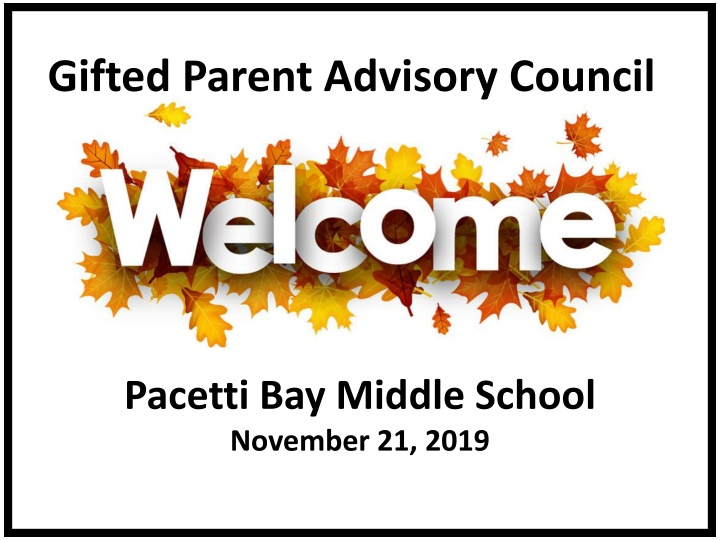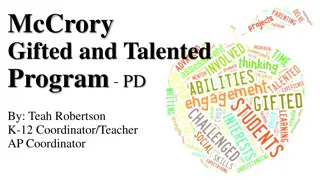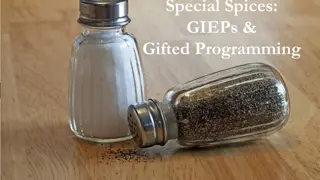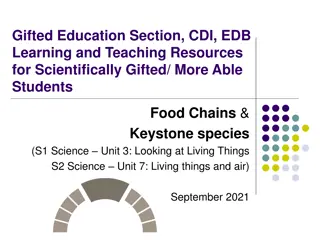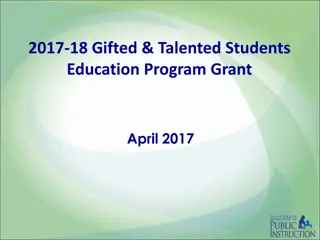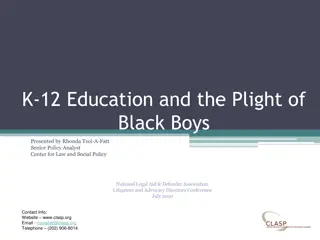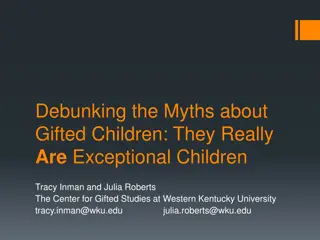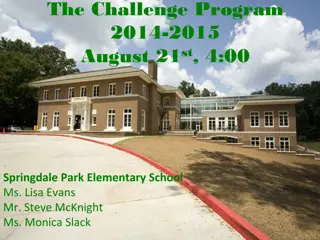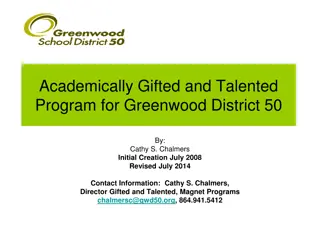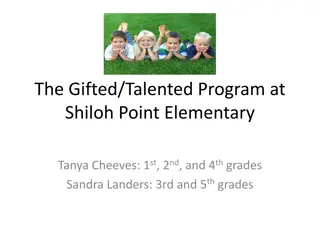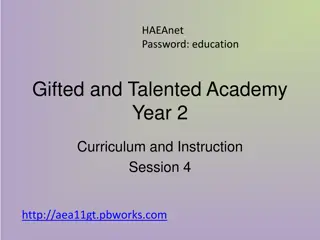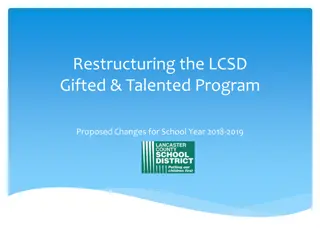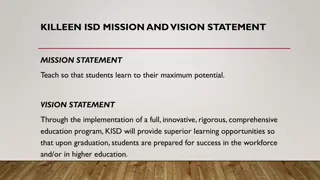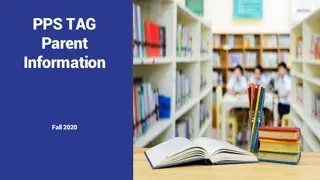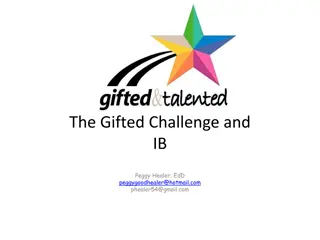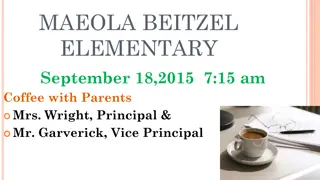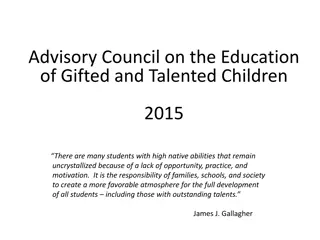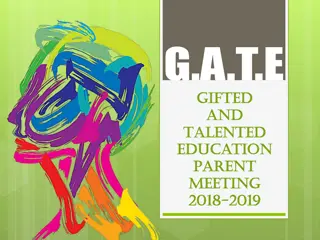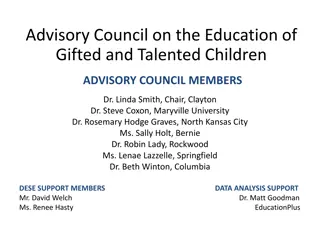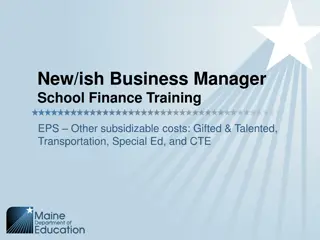Gifted Education Insights and Resources
Various images and quotes related to gifted education, featuring Gifted Parent Advisory Council events, district gifted teams, specialists, and educational insights. The content highlights the importance of play in learning, explores major concerns for ESE/gifted students, and emphasizes the role of relationships and mental health in education. Insightful quotes from Plato and Dr. Karyn Purvis underscore the significance of play and understanding individuals beyond mere conversation.
Download Presentation

Please find below an Image/Link to download the presentation.
The content on the website is provided AS IS for your information and personal use only. It may not be sold, licensed, or shared on other websites without obtaining consent from the author.If you encounter any issues during the download, it is possible that the publisher has removed the file from their server.
You are allowed to download the files provided on this website for personal or commercial use, subject to the condition that they are used lawfully. All files are the property of their respective owners.
The content on the website is provided AS IS for your information and personal use only. It may not be sold, licensed, or shared on other websites without obtaining consent from the author.
E N D
Presentation Transcript
Gifted Parent Advisory Council Pacetti Bay Middle School November 21, 2019
Helen DiMare SJCSD Gifted Program Specialist
Your K-12 District Gifted Team! Vicky Alvarez Jennifer Odom Heidy Weaver Jaci Racano Diana Shelton Erin Arnold Ponte Vedra Bartram Trail Creekside Pedro Menendez Nease St. Augustine Landrum Fruit Cove Pacetti Bay Swiss Point Murray Sebastian CCES Hartley RB Hunt SJTHS SJVS Gaines
Your K-8 District Gifted Team! Megan Stone Amy Brim Brandie Seaman Valley Ridge Jen Earnshaw Tonya Wells Palencia PV/PV Rawlings Hickory Creek Julington Creek Timberlin Creek Palm Valley Liberty Pines Ocean Palms Webster Mill Creek Freedom Crossing Wards Creek Osceola Otis Mason Picolata Crossing South Woods Ketterlinus Patriot Oaks Creekside Landrum Durbin Creek Gamble Rodgers
Amanda Zikos Odyssey of the Mind
Image result for florida association for the gifted conference
Power of Play Erin Arnold District Gifted Consultative Teacher
You can discover more about a person in an hour of play than in a year of conversation. -Plato
Why Play? "Scientists have recently determined that it takes approximately 400 repetitions to create a new synapse in the brain - unless it is done with PLAY, in which case it takes between 10 -20 repetitions. Dr. Karyn Purvis
Major Concerns for ESE/Gifted Students Peer/Teacher Relationships Perfectionism Anxiety/Depression Attendance Feelings of Frustration, Sadness, Shame Behavioral Problems Negative Labels Self-Esteem/Self-Worth Imposter Syndrome
Benefits of Play: According to the UN Increases self-awareness, self-esteem, and self respect Improves and maintains physical and mental health Provides opportunities to mix with children of different abilities Increases confidence through developing new skills Promotes imagination, independence, and creativity Provides opportunities for developing social skills and learning Builds resilience through risk taking and challenge, problem solving and dealing with new/novel situations Provides opportunities to learn about their environment and the wider community
Play is an essential part of every child s life and is vital for the enjoyment of childhood as well as social, emotional, intellectual, and physical development. www.playengland.org.uk
First hand experiences of the raw, primary expressions of joy, fear, anger, sadness, shock, and disgust are essential for these types of processes to take place. Play provides a relatively safe context in which these primary emotions can be expressed, while being held in check by the rules, rituals, and play signals of the game. These rules, rituals, and play signals are in turn, driven by the more social, secondary emotions such as pride, shame, and sympathy. Sutton-Smith, 2003
Play helps build resilience through developing regulation of emotions, attachment to peers and places, stress response systems, emotional health through pleasure and enjoyment, and physical health. www.playengland.net
Play Researcher: Dr. Stuart Brown 7 Properties of Play Purposeless Voluntary Inherent Attraction Freedom From Time Diminished Consciousness of Self Improvisational Potential Play Produces Continuation Desire
Why arent kids getting enough play? Constantly increasing pressure in academics Reduced recess, increased structure in play Screen time increasing Homework Excessive after school activities Too much coaching/pressure to achieve
What does play mean as a family? Play does not have to be torture Brene Brown- Have family members write down everything they consider play Go through the lists together to see if there is anything that everyone has in common Plan to do those things as a family to play Try to be flexible without being forced
The Science of Laughter Laughter improves blood circulation which helps children achieve better concentration power and enhance academic performance As students laugh in school, they get better at handling academic pressure Laughter builds self-confidence and the ability to handle stress by boosting the immune system and releasing endorphins Laughing with students enhances communication and cooperation Laughter connects people from all academic abilities and diverse backgrounds www.laughteronlineuniversity.com
You can discover more about a person in an hour of play than in a year of conversation. -Plato
Self Reflection What do you do for play? Are you finding ways to have fun with your family? When you have fun, your children do too. Reminder for this year: Exhaustion is not a status symbol, it is a symptom of a bigger issue. Rejuvenate by playing and laughing, it will make you a better parent.
